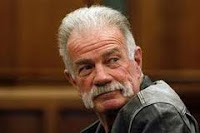 |
| Terry Jones in court |
Anyway, as the article says, under current law, this is a pretty clear cut case, but it got me thinking. The mayor said that he was worried about violence, and that the prosecution was over a public safety issue. He's probably thinking about the murders that the perpetrators blamed on Terry Jones' last Koran burning. Under the prevailing standard, Brandenburg v. Ohio, only incitement to crime or violence is unprotected by the First Amendment, not encouragement or advocacy. Under the still-sometimes-cited-for-some-unknown-reason standard, "clear and present danger," which Brandenburg replaced, there was wider latitude to ban speech. Under either standard, intervening time and third-party decision-making made the connection to violence more remote, and thus the First Amendment protection of the speech greater.
Here's the wrinkle that may or may not be a wrinkle: The point of looking at intervening time and possibility for choice is because another person's will would then be the real cause for violence. On some level, though, we expect those choices to be influenced by our criminal law, so a potential retaliator can rethink any violence. Well, the violence they're worried about in this case is by people not subject to any law in US jurisdiction. If we know that the violence against Americans will occur, and our law cannot influence it, does that call into question the reasoning of Brandenburg, and/or does it fall within the "clear and present danger" test instead?
More generally, then, with the internet and instant global communication, should we be taking the opportunity to reconsider incitement? Whereas before it would have been impossible, it is trivial now for someone to react violently to speech halfway across the world, immediately after he he sees the speech on YouTube. If we cannot prevent the violence through criminal sanctions for want of jurisdiction, should the First Amendment bend?
I'd say probably not, in this case at least. It's still a hecklers veto, as Professor Len Niehoff (my Note advisor, incidentally), says in the article. A heckler's veto is when a person is silenced by the state for fear of third party disapproval. ("I don't mind what you're saying, but those people over there are getting pissed, so I'm going to arrest you for breaching the peace.") It's a First Amendment violation. However, even a heckler's veto bends. If there's an angry mob, an on-site police officer is constitutionally required first to try and prevent the mob from dismembering the speaker. However, if he cannot control the mob, he can silence and remove the speaker for safety reasons. I don't know that this is a close enough analogy to warrant a change - just a thought I had.
0 comments:
Post a Comment